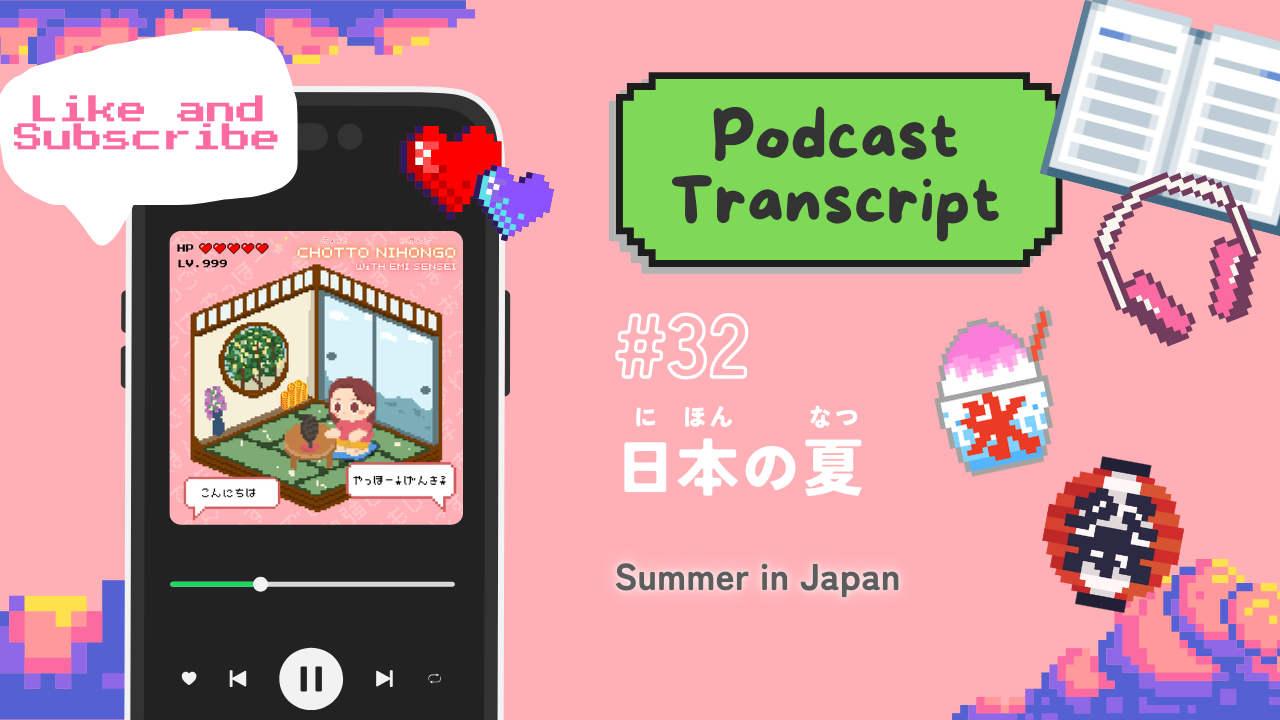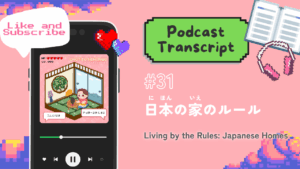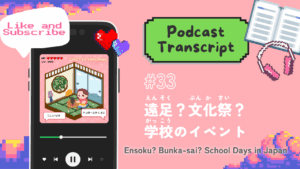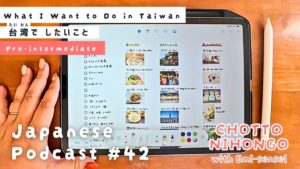おすすめの Google 拡張機能です!新しい言葉を勉強しましょう!
Here are the recommended Chrome extensions! Let’s learn new words here!
ポッドキャストプラットフォーム|Platforms of Podcast
こちらの記事は、配信中のポッドキャストのスクリプトです。
ぜひ、ポッドキャストを聞きながら読んでください。
 えみ先生
えみ先生もう聞いた人は、クイズをチェックしましょう!
ことばワークシート|Vocabulary Worksheet from This Episode
えみ先生がエピソードでつかった、ちょっとむずかしいことばを、ワークシートにまとめました。
ワークシートは、エピソードごとに、ひとつひとつ作っています。
それぞれ1ドルです。
その1ドルが、えみ先生のポッドキャストのサポートになります。🫶
【えいご】English Translation
I made a worksheet with some of the slightly difficult words from each episode.
Each worksheet is created just for that episode.
Each one is only $1.
And that $1 is a kind way to support my podcast. 🫶
ちょっとクイズ!|CHOTTO Quiz!
ポッドキャストを聞いた人は、ちょっとクイズを解いてみましょう。
むずかしいときは、下のスクリプトを読んで、もう一度クイズをチェックしてみてください。
【えいご】English Translation
Answer these quiz questions if you’ve listened to a new episode of my podcast.
If it was difficult, read the transcript below and try again.
❓ お盆はいつですか?|When is the event called Obon?
8月13日から16日までです。
It is from August 13th to 16th.
❓ 熱海花火大会はどこで花火が上がりますか?|Where do the fireworks go up at the Atami Fireworks Festival?
海の上で花火が上がります。
They go up over the sea.
❓ えみ先生が好きなかき氷の味は 何ですか?|What is Emi-sensei’s favorite flavor for shaved ice?
えみ先生は、メロン味のかき氷が好きです。
Emi-sensei likes melon-flavored shaved ice.
ポッドキャストのスクリプト|Transcript of Podcast
エピソード32「日本の夏」
このポッドキャストは、初中級(Pre-Intermediate)レベルです。
おはようございます。こんにちは。こんばんは。
日本語の先生、エミです。
みなさん、みなさんの国の夏はどうですか?
日本は まだまだ暑いです。とっても暑いです。
しかも、ただ暑いだけじゃありません。
蒸し暑いです。Humidですね。
日本は、9月の終わりぐらいまで蒸し暑い日が つづきます。
みなさんの国はどうですか?
いつまで暑いですか?いつから涼しくなりますか?
【えいご】English Translation
Good morning. Hello. Good afternoon.
I am a Japanese teacher, Emi.
Everyone, how is the summer in your country?
In Japan, it is still very hot. Extremely hot.
And it’s not just hot. It’s humid.
In Japan, humid days continue until around the end of September.
How about in your country?
Until when is it hot? From when does it become cool?
まだまだ日本は暑いんですけど、 私は今週、週3回ジムに行きました。
しかも、昼に歩いて行きました。
いつもジムに行くときは、20分 歩いて行って、30分トレーニングをして、また20分 歩いて帰ってきます。
今週は、それを 3回しました。
ちょっと 疲れました。
でも、今週はつけ麺を食べたり、アイスを食べたり、おいしいものをたくさん食べたので、運動してよかったです。
おすすめのトレーニングがあったら教えてください。
【えいご】English Translation
Even though it’s still hot in Japan, this week I went to the gym three times.
And I even walked there at noon.
Usually, when I go to the gym, I walk for 20 minutes, train for 30 minutes, and then walk 20 minutes back home.
This week, I did that three times.
I was a little tired.
But this week I ate tsukemen (Dipping noodles) and ice cream and lots of delicious food, so I’m glad I exercised.
If you have any recommended training, please tell me.
ここで先週の質問をチェックしましょう。
先週は こんな質問をしました。
「あなたの国の夏はどんなふうに過ごしますか?」
こんな質問でした。
【えいご】English Translation
Alright, now let’s check last week’s question.
Last week, I asked this question:
“How do you spend summer in your country?”
That was the question.
今日は、日本の夏についてお話します。
夏のイベントや食べ物を紹介しますね。
【えいご】English Translation
Today, I will talk about summer in Japan.
I will introduce summer events and food.
まず、日本の夏でとっても大事なイベントは「お盆」です。
「お盆」、聞いたことがありますか?
お盆は、亡くなった人を思い出して、ご先祖様を大切にするイベントです。
ちょっと むずかしい言葉がありました。
チェックしましょう。 2つの言葉をチェックします。
【えいご】English Translation
First, a very important summer event in Japan is “Obon.”
Have you heard of Obon?
Obon is an event to remember people who have passed away and to honor your ancestors.
There were some difficult words, so let’s check. Two words.
1つ目「亡くなる」
「亡くなる」は「死ぬ」と同じ意味ですが、「亡くなる」の方が ていねいな言葉です。
「死ぬ」はちょっと強い言葉ですね。
そして2つ目、「ご先祖様」
「ご先祖様」は、亡くなった自分の家族のおじいさんやおばあさん、その前の世代(generation)の人たちのことです。
【えいご】English Translation
First: “nakunaru.”
“Nakunaru” means the same as “shinu” (to die), but “nakunaru” is more polite.
“Shinu” is a bit of a strong word.
Second: “gosenzosama.”
“Gosenzosama” means your ancestors: the grandfathers, grandmothers, and earlier generations of your family who have passed away.
お盆は、毎年8月13日から16日までの4日間です。
この時期は、家族みんなが集まってご飯を食べたり、お墓参りに行ったりします。
お墓参りはVisiting the family graveです。
お墓がGraveですね。
家族で集まると、ご先祖様も一緒に帰ってきている気持ちになります。
【えいご】English Translation
Obon is every year from August 13th to 16th, four days.
During this time, families gather together, eat meals, and visit graves.
Visiting the family grave is “ohakamairi.”
The grave is “(o)haka.”
When the family gathers, people feel as if the ancestors also return home together.
お盆のシーズンには、夏祭りや盆踊りもあります。
「盆踊り」は、お盆のダンスのことです。
太鼓の音を聞きながら、みんなで踊ります。
YouTubeで盆踊りと検索すると、たくさん動画が出てきますよ。
見てみてください。
お盆じゃないときも、日本には夏祭りがあります。
夏祭りには食べ物の屋台がたくさん出ます。
屋台は、Food standですね。
たとえば、焼き鳥、たこ焼き、焼きそば、かき氷。
とても にぎやかで楽しいです。
そして、夜は花火があります。
【えいご】English Translation
During Obon season, there are also summer festivals and Bon dances.
“Bon odori” is the dance of Obon.
People dance together while listening to the sound of taiko drums.
If you search “bon odori” on YouTube, many videos will come up.
Please take a look.
Even when it’s not Obon, there are summer festivals in Japan.
At summer festivals, many yatai (food stands) appear.
For example, yakitori, takoyaki, yakisoba, kakigori.
It’s very lively and fun.
And at night, there are fireworks.
夏の花火大会は、日本の夏のイベントの1つです。
私も、今年は 2回花火を見に行きました。
私のお気に入りは、静岡県の「熱海花火大会」です。
熱海の海の上に、大きな花火が上がります。
「熱海」は、街の名前です。
20分ぐらいずっと花火が つづくので、本当にきれいです。
しかも、熱海花火大会は夏だけじゃなくて、春や秋にもあります。
日本に来たら、ぜひ行ってみてください。 おすすめです。
【えいご】English Translation
Summer fireworks festivals are one of the summer events in Japan.
This year, I went to see fireworks twice.
My favorite is the Atami Fireworks Festival in Shizuoka Prefecture.
Huge fireworks rise over the sea of Atami.
“Atami” is the name of the town.
The fireworks continue for about 20 minutes, so it’s really beautiful.
And the Atami Fireworks Festival is not only in summer—it also happens in spring and autumn.
If you come to Japan, please go. I recommend it.
次は、夏の食べ物を紹介します。
日本には、それぞれの季節に人気な食べ物があります。
【えいご】English Translation
Next, let me introduce summer food.
In Japan, each season has popular foods.
まず、「そうめん」。
そうめん、聞いたことありますか?
そうめんは、ラーメンやうどんと似ています。
でも、ラーメンやうどんは太いです。 太い。Thick.
そうめんは細い麺です。 細い。Thin.
ラーメンよりも細くて、冷たい水で冷やして食べます。
だから、暑い日でも食べやすいです。
夏は、流しそうめんをしているレストランもあります。
流しそうめんは、竹(Bamboo)の中に水を流して、そこにそうめんを流します。
すずしいし、楽しいし、日本の料理も楽しめるので、日本に来たらやってみてください。
【えいご】English Translation
First, “somen.”
Have you heard of somen?
Somen is similar to ramen or udon.
But ramen and udon are thick (futoi).
Somen is thin (hosoi) noodles.
It’s thinner than ramen, and you eat it chilled with cold water.
So, even on hot days, it’s easy to eat.
In summer, there are also restaurants with nagashi somen.
Nagashi somen is when water flows through take (bamboo), and the somen noodles flow along with it.
It’s cool, fun, and lets you enjoy Japanese food, so please try it when you come to Japan.
もう一つ夏の食べ物があります。
「かき氷」です。
かき氷、知っていますか? Shaved iceです。
氷をけずって、シロップをかけたデザートです。
お祭りの屋台でも よく売っています。
イチゴ味、メロン味、ブルーハワイ味など、いろんな味があります。
私はメロン味が好きです。
みなさんの国には、夏の食べ物やデザートありますか?
教えてください。
【えいご】English Translation
Another summer food is “kakigori.”
Do you know kakigori? It’s shaved ice.
It’s shaved ice with syrup poured on top.
It is often sold at festival food stands.
There are many flavors, like strawberry, melon, Blue Hawaii.
I like melon flavor.
Does your country have summer foods or desserts?
Please tell me.
はい。 今日は、日本の夏についてお話しました。
3つ話しましたね。
1 「お盆」 家族で集まって、ご先祖様(Ancestors)を大切にするイベント
2 「夏祭りと花火大会」
3 「夏の食べ物」 そうめんとかき氷
【えいご】English Translation
So today, I talked about summer in Japan.
I talked about three things:
1. Obon — a family event to honor ancestors.
2. Summer festivals and fireworks festivals.
3. Summer foods — somen and kakigori.
はい、どうでしたか?
知っているイベントはありましたか?
みなさんの国の夏と日本の夏は似ていますか?
それとも全然ちがいますか?
みなさんの国の夏について、コメントで教えてください。
【えいご】English Translation
How was it?
Were there events you already knew?
Is summer in your country similar to summer in Japan?
Or completely different?
Please tell me about summer in your country in the comments.
では、今日も みなさんに 質問があります。
「学校の思い出で、一番楽しかったことはなんですか?」
日本の学校には、いろんなイベントがあります。
勉強だけじゃありません。
運動会、遠足、文化祭、体育祭。
聞いたことあるイベントはありますか?
来週は、日本の学校のイベントについて話します
知りたいイベントがあったら、コメントで教えてくださいね。
【えいご】English Translation
Now, I have a question for you today, as always.
“What was the most fun memory from your school days?”
In Japanese schools, there are many events.
Not only studying.
Sports day, excursions, cultural festivals, athletic festivals.
Have you heard of any of these events?
Next week, I will talk about school events in Japan.
If there’s an event you want to know about, please tell me in the comments.
今日のポッドキャストのスクリプトは、私のウェブサイトにあります。
ウェブサイトは、 en-nihongo.com です。
よかったら、ポッドキャストの感想や、質問の答えをコメントで教えてください!
じゃあ、また来週のポッドキャストで会いましょう。
じゃあね~!
【えいご】English Translation
A transcript for today’s podcast is on my website.
The website is en-nihongo.com .
I’d be very happy if you could share your thoughts/impressions or could answer the question I asked in this episode!
I’ll see you in the next episode.
Jaa ne-!








コメント|Comment